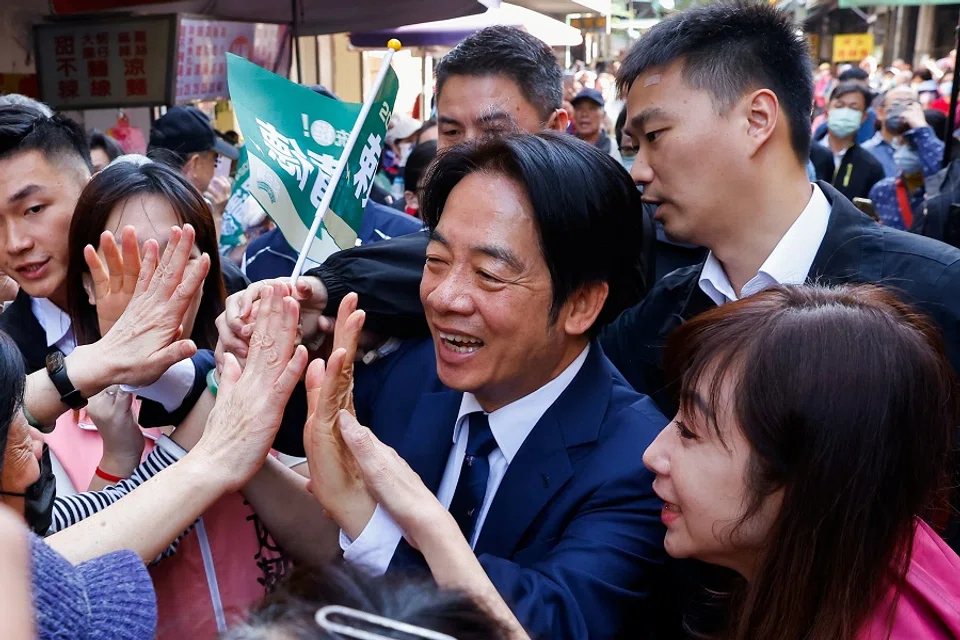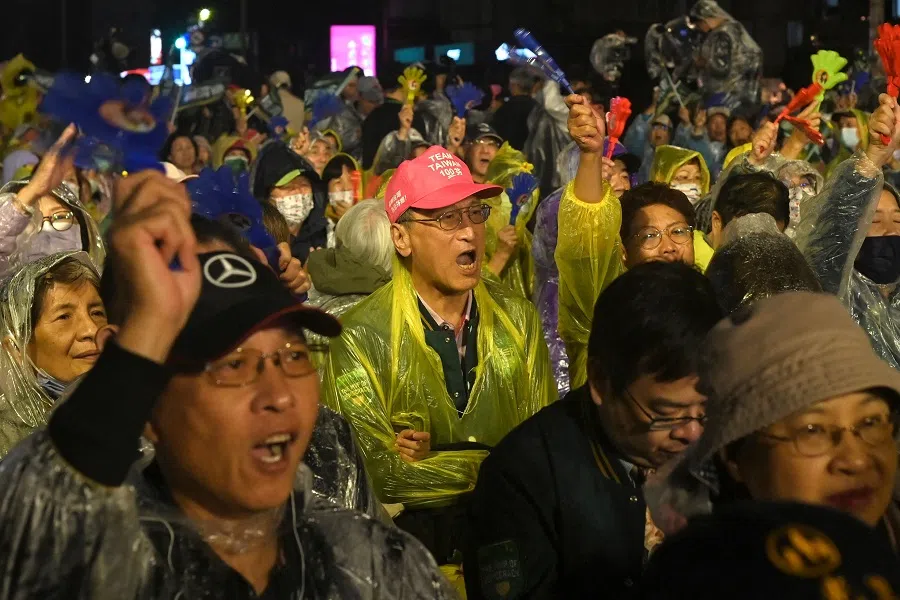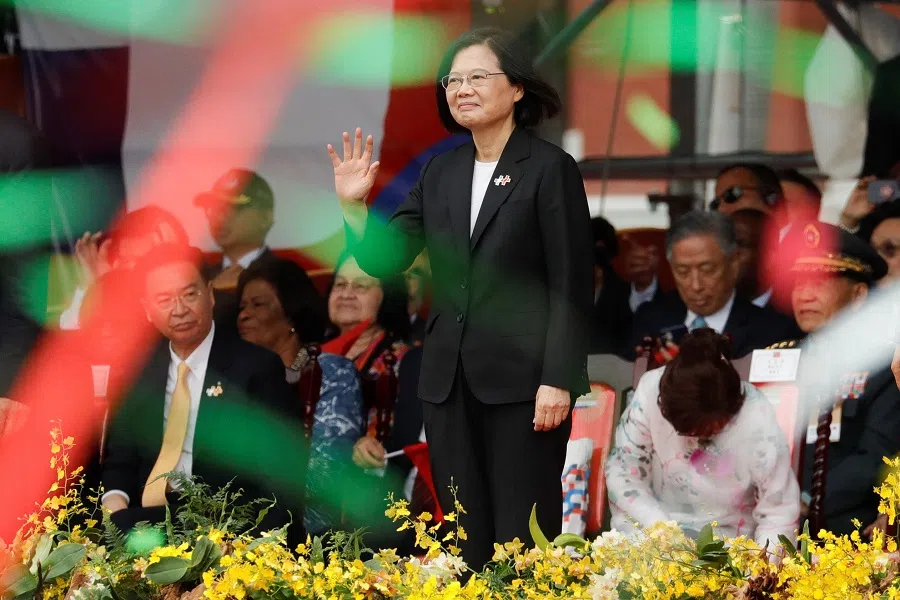Is the US worried about William Lai winning the Taiwan presidential election?
US academic Zhu Zhiqun notes that while it seems that the US is worried about the DPP's William Lai winning the elections, a DPP win might aid the US's implementation of its Indo-Pacific policies. In that light, academics and officials offering advice on how Lai should act if he wins the election can be seen as helping to ensure that the direction of the current Tsai administration would be continued, as it best fits US interests.

Amid the countdown to the 2024 Taiwanese presidential election, various parties are analysing and predicting the election's outcome, as well as the possible impacts it may have on both sides of the Taiwan Strait, China-US relations and the Asia-Pacific region.
Some polls in Taiwan show that the gap between William Lai and Hsiao Bi-khim of the Democratic Progressive Party (DPP) and Hou You-yi and Chao Shao-kang of the Kuomintang (KMT) has been narrowed to within the margin of error, and it is difficult to tell who will win in the end.
As Lai is a more resolute supporter of "Taiwan independence" than current Taiwan President Tsai Ing-wen, and Hou upholds the 1992 Consensus and is willing to foster friendly relations with the mainland, many people see this election as a choice between war and peace.
The US has always paid attention to Taiwan's political situation. In October this year, chair of the American Institute in Taiwan Laura Rosenberger said in Taiwan that the US does not support unilateral changes to the status quo by either Beijing or Taipei.

Three influential academics - Bonnie S. Glaser, managing director of the Indo-Pacific Program at the German Marshall Fund; Cornell University professor Jessica Chen Weiss; and Columbia University professor Thomas Christensen - jointly wrote a commentary in Foreign Affairs on 30 November, asserting that a strong deterrent to avert a crisis in the Taiwan Strait must be accompanied by credible "assurances" from all three parties involved. That is, the US must maintain the status quo by concurrently opposing the mainland's attempt to pursue reunification by force and Taiwan's political move to pursue independence; while Beijing could reiterate its preference for peaceful reunification - as long as Taiwan refrains from pushing for formal independence, the mainland will not use force. The commentary also urged Lai, should he win the election, to consider suspending the independence clause in the 1991 party charter, as this would give any rhetorical commitment to the status quo more weight and credibility.
... now that Lai has adjusted his longstanding position as a "pragmatic worker for Taiwan independence" and pledged to follow in the footsteps of Tsai, the US should be satisfied.
Pressure from various quarters
Many believe that the US, from its officials to academics, is concerned that Lai's election would trigger a Taiwan Strait crisis, and they are using different channels in the final weeks before the election to voice their concerns in an attempt to put pressure on Lai; some have even speculated if the US prefers Hou over Lai.
Frankly, the US will not openly express its preference and will accept the outcome of the elections. However, US officials and most academics felt that for nearly eight years, Tsai has been relatively steady, having strengthened the island's defence and Taiwan-US relations without significantly provoking mainland China. The US has a very high opinion of Tsai, and now that Lai has adjusted his longstanding position as a "pragmatic worker for Taiwan independence" and pledged to follow in the footsteps of Tsai, the US should be satisfied. At the same time, Lai's decision to pick Hsiao as his running mate must have put the US at ease as well, given that Hsiao is very well-connected in Washington.

So, rather than pressuring Lai, it is more accurate to say that Rosenberger, Glaser and others are providing Lai with advice or direction. Many people once believed that Lai would win without a fight if the Blue-White alliance collapsed. But now that support for candidates from the Blue and Green camps are neck and neck, it is hard to predict the ultimate victor.
Under such circumstances, if Lai responds positively to the US's concerns and is more flexible in his presentation of cross-strait issues or moderates his stance on "Taiwan independence", he will be able to attract more undecided and younger voters, increasing his chances of being elected.
... when the US expressed their concerns about Lai, it was not to show their dissatisfaction towards him or to help Hou get elected; it was done in hopes that the direction of the current Tsai administration would be continued, as it best fits US interests.
DPP win might benefit the US
Having the DPP in charge might be more advantageous for the US in implementing its Indo-Pacific strategy; a DPP administration would be subservient to the US, which could then gain greater control over the political situation in Taiwan and cross-strait relations. One might say when the US expressed their concerns about Lai, it was not to show their dissatisfaction towards him or to help Hou get elected; it was done in hopes that the direction of the current Tsai administration would be continued, as it best fits US interests.
The DPP is adept at packaging and marketing itself. Because of China-US rivalry, the Biden administration's dichotomy of "democracy versus autocracy" in its foreign policy, and the effects of the Russia-Ukraine war and the Israel-Hamas conflict, the American public is more supportive of the government protecting "democratic Taiwan". This is helpful for the DPP in pushing for its relevant policies and narratives, indirectly causing the US to deviate from its "one China" policy in handling cross-strait issues, and favour the DPP administration.
DPP's position
Indeed, some of the DPP's international publicity has deeply influenced the narratives in the US and other Western nations. For example, the DPP administration feels that it has not changed the status quo, and that Taiwan is already independent, with its name being the Republic of China (Taiwan), and both the ROC and the PRC are "not subordinate" to each other.

Another example would be how the DPP has simplified the upcoming election to a choice between being "pro-US" and "pro-China"; between protecting Taiwan's democracy and freedom or letting it regress to the old "one China" path; and between fighting back against China's "invasion" or protecting Taiwan's sovereignty.
As former Taiwan President Ma Ying-jeou pointed out, Tsai's statements on the issue have sought to change the status quo between both sides of the strait, and is a "two states narrative" that goes against the ROC Constitution. Yet, many Western politicians and even academics align themselves with the DPP's narrative, much less the average person who does not understand cross-strait relations and the complexities of China-US relations.
... without the US's tacit approval, no Taiwanese leader would go too far on an extreme course.
The average American agrees with the DPP's position, and thinks that Taiwan and China are two separate states and that "autocratic" China wants to annex "democratic" Taiwan. Surveys in recent years show an increasing number of Americans who support the government in sending troops to defend Taiwan. According to the latest survey from the Reagan National Defense Forum, if mainland China were to "invade" Taiwan, 46% of American respondents would support committing ground troops to defend Taiwan, while 72% of Americans would support officially recognising Taiwan as an independent country.
Perhaps the US government need not worry about Lai's electoral victory bringing trouble to the US; after all, without the US's tacit approval, no Taiwanese leader would go too far on an extreme course. Perhaps when it comes to preventing war in the Taiwan Strait, what the US government should worry about is: one, how to convince the American public why the US must uphold the policy of neither supporting Taiwan independence nor supporting "one China, one Taiwan"; and two, how to prevent some members of Congress from holding American public opinion hostage to force the US administration to cross the red line of the Chinese side on the Taiwan issue, thereby triggering a war.
This article was first published in Lianhe Zaobao as "美国担心赖清德胜选吗?".



![[Big read] When the Arctic opens, what happens to Singapore?](https://cassette.sphdigital.com.sg/image/thinkchina/da65edebca34645c711c55e83e9877109b3c53847ebb1305573974651df1d13a)
![[Video] George Yeo: America’s deep pain — and why China won’t colonise](https://cassette.sphdigital.com.sg/image/thinkchina/15083e45d96c12390bdea6af2daf19fd9fcd875aa44a0f92796f34e3dad561cc)
